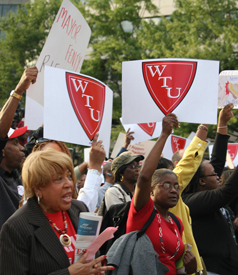The news is full of bad news about unions these days. Unions are blamed for holding up the bailout of GM and Chrysler with foot-dragging over wages and benefits. Teachers’ unions are accused of protecting bad teachers and standing in the way of providing good education. Public employees are supposed to be overpaid and lazy. The bottom line seems to be that, at best, unions are dinosaurs and about to go extinct. At worst, they are a drag on our economy.
So, why have unions? Because the persistent problem of unlimited corporate power requires an effective counterbalance.
The need for such a counterbalance is clear. We saw the effect of increasing corporate power in the 2010 elections. We see it in virtually every law considered by Congress and state legislatures. And we saw it in the period leading up to the 1929 stock market crash and the Great Depression. As corporations grow mightier, they are able to amass even greater power. Then, just as now, Supreme Court decisions made corporations unaccountable to their societies by removing limits on corrupting and destructive power wielded by corporations.
Among other actions Congress took to limit irresponsible corporate power was to enact the National Labor Relations Act in 1935. Congress wanted to give unions power to act as a counterbalance to corporate power.
As Congress saw it, corporation law had allowed individuals who were employers to collectively amass unchecked power. Employees, on the other hand, were mere individuals who lacked the power to bargain as equals with their employers. The result was depressed wages and working conditions that led to economic collapse and then economic unrest. Congress’ solution was to give workers the ability to become collective in order to amass power so they could act as a counterbalance to corporate power. Workers who cannot say no to unjust actions are no more than slaves and not free people, not citizens of a democracy. Here is how Congress put it 75 years ago: “The inequality of bargaining power between employees who do not possess full freedom of association or actual liberty of contract and employers who are organized in the corporate or other forms of ownership association substantially burdens and affects the flow of commerce, and tends to aggravate recurrent business depressions, by depressing wage rates and the purchasing power of wage earners in industry and by preventing the stabilization of competitive wage rates and working conditions within and between industries.”
Today, we are reliving the dynamics of unchecked corporate power that led to the Great Depression. The Great Recession could not have been a surprise to anyone who was paying attention to the erosion of pay and working conditions and to the steady increase in poverty and unemployment.
We make a grave mistake when we blame unions for doing their job – for being a counterbalance to corporate power. Unions have a legal obligation to be the disloyal opposition. When there is no check on the steady growth of corporate power, we lose the balance and equality necessary to democracy. In fact, unions promote citizenship in the workplace and in their communities. Unions give workers rights of due process and equal protection in their workplaces.
Union members act like citizens of a democracy in their communities. They are informed on the issues; they vote in far higher numbers than nonmembers, and they get out the vote.
The United Auto Workers (UAW) was not obstinate in holding up the bailout of GM and Chrysler over issues of employee wages and benefits. Left out of the public discussion was that those employees paid for their benefits by accepting lower pay over the years in exchange for a secure retirement. Had the autoworkers opted for pay instead, they could have put it in the bank. Instead, the bank where they put their money was in their benefits. The UAW was doing its job by slowing down the process in order to protect the interests of the workers it was legally and morally obligated to represent.
Teachers’ unions have been accused of protecting bad teachers. But what teachers’ unions – and all unions do – is ensure that employees who are accused of not doing their jobs get fair representation, a fair process and do not lose their jobs without just cause. What worker, what person, in a time of trouble would not want someone to stand beside them and ensure they get fair treatment? And how, exactly, does the workplace and our society benefit from firing a worker for no good reason? Equal protection and a fair process are sacred American values.
It is for all these reasons that Congress said 75 years ago: “It is declared to be the policy of the United States to eliminate the causes of certain substantial obstructions to the free flow of commerce and to mitigate and eliminate these obstructions when they have occurred by encouraging the practice and procedure of collective bargaining and by protecting the exercise by workers of full freedom of association, self-organization, and designation of representatives of their own choosing, for the purpose of negotiating the terms and conditions of their employment or other mutual aid or protection.”
All these rights are still the policy of the United States, rights that are enforced by unions, including when they say, “No!”
24 Hours Left: All gifts to Truthout now matched!
From now until the end of the year, all donations to Truthout will be matched dollar for dollar up to $18,000! Thanks to a generous supporter, your one-time gift today will be matched immediately. As well, your monthly donation will be matched for the whole first year, doubling your impact.
We have just 24 hours left to raise $18,000 and receive the full match.
This matching gift comes at a critical time. As Trump attempts to silence dissenting voices and oppositional nonprofits, reader support is our best defense against the right-wing agenda.
Help Truthout confront Trump’s fascism in 2026, and have your donation matched now!
